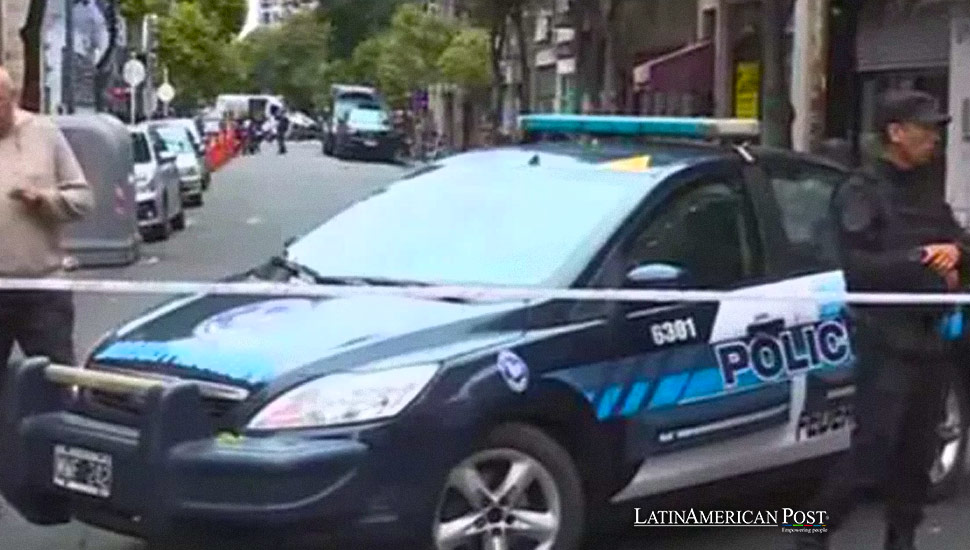Heightened Security at AMIA: Reflecting on Argentina’s Traumatic Past

A bomb threat at the Argentine Israelite Mutual Association (AMIA) building in Buenos Aires prompted an urgent police response, reminding the nation of its vulnerable past and ongoing commitment to combatting terrorism.
This week, an unsettling echo of Argentina’s turbulent history resounded through the streets of Buenos Aires as a bomb threat targeted the headquarters of the Argentine Israelite Mutual Association (AMIA). This incident brought back painful memories of the devastating 1994 bombing that remains the deadliest terrorist attack on Argentine soil. Official sources reported that the threat, which turned out to be a hoax, prompted a rigorous police operation that found no explosives.
The bomb scare began with a phone call received at 14:22 local time, claiming a potential threat at the AMIA building. The call led to immediate street closures around the area as a precaution. Following established security protocols, the leadership of AMIA and the Delegation of Israeli-Argentine Associations (DAIA) swiftly involved the Anti-Terrorism Investigation Unit of the Federal Police of Argentina.
Both the AMIA and DAIA buildings underwent a thorough inspection. Fortunately, this did not necessitate an evacuation, and the police operation concluded without uncovering any immediate danger. The scare was a false alarm, but it served as a stark reminder of the ongoing threats faced by Jewish communities in Argentina.
A Legacy of Violence and Vigilance
Argentina is no stranger to anti-Semitic violence. The nation still bears the scars of two major terrorist attacks targeting Jewish sites: the 1992 bombing of the Israeli Embassy and the 1994 AMIA attack. Both incidents, which occurred in Buenos Aires, collectively resulted in 107 deaths and injured hundreds, intensely shaking the Argentine society and its substantial Jewish community.
The 1994 AMIA bombing, in particular, has been a significant point of national trauma and an unresolved wound. The attack, attributed to extremists with alleged backing from foreign governments, has led to decades of investigations marred by accusations of cover-ups and corruption. Despite the passage of years, the demand for justice and accountability remains a potent force in Argentine politics and society.
Current Political Context and Security Measures
The recent bomb threat occurs against a backdrop of renewed international focus on terrorism, driven by Argentina’s current political stance. President Javier Milei’s administration has adopted a strongly pro-Israel position amidst ongoing conflicts in the Middle East. His vocal support includes condemning attacks by Iran against Israel and affirming Israel’s right to defend itself against what he describes as regimes promoting terrorism.
In a bold move aligning with his foreign policy, President Milei has announced plans to relocate the Argentine Embassy from Tel Aviv to Jerusalem, further solidifying Argentina’s support for Israel. While reinforcing international alliances, this decision also reflects an awareness of the geopolitical complexities and potential repercussions for security at home.
Enhancing Community Safety
In response to these threats and in recognition of the historical context, Argentina has taken significant steps to bolster security for its Jewish community and other vulnerable groups. This includes enhanced cooperation with international intelligence agencies and implementing advanced security technologies at sensitive sites.
Moreover, President Milei’s government has established a crisis committee to address situations in the Middle East. This committee also considers the security implications for Argentine nationals and interests both domestically and abroad. This proactive stance is part of a broader effort to prevent future attacks and ensure that the tragedies of the past are not repeated.
Moving Forward with Resilience and Solidarity
The false alarm at AMIA underscores the ongoing challenges and the need for vigilance, but it also highlights the resilience of the Jewish community in Argentina. The quick and coordinated response to the threat reflects a society that, though marked by past violence, is committed to safeguarding its citizens and learning from its history.
Also read: Argentina’s Milei Again Seeks Radical Economic Overhaul with New Bills
As Argentina continues to navigate its role on the international stage and its internal commitments to security and justice, the memories of attacks like those on the AMIA and the Israeli Embassy serve as sobering reminders of the cost of complacency. For the survivors and the families of the victims, as well as for the Argentine nation as a whole, the fight against terrorism and anti-Semitism is far from over. It is a continuous journey towards healing, justice, and the assurance that such horrors are never repeated.





